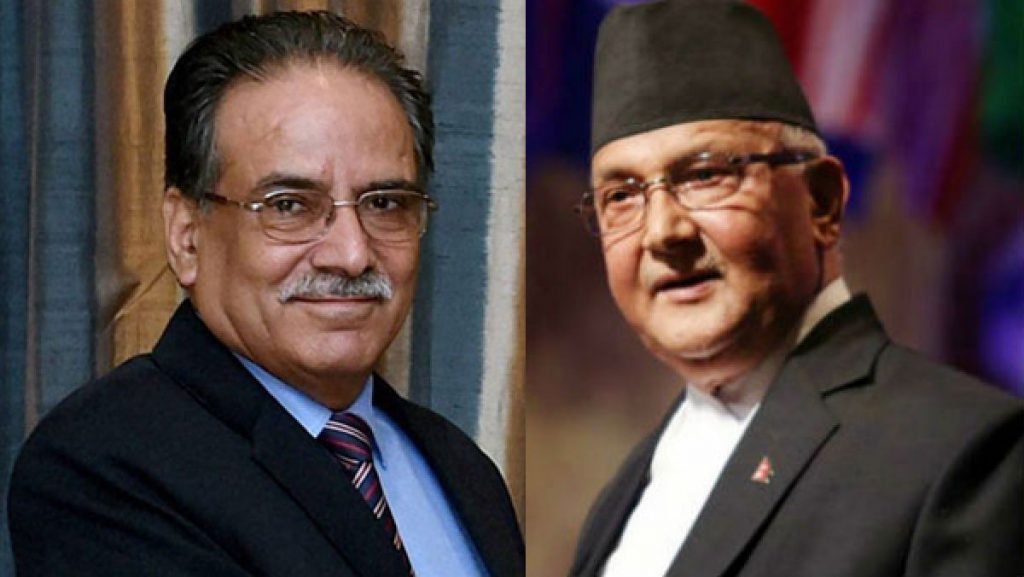Kathmandu, Jan 24: Prime Minister KP Sharma Oli was expelled from the general membership of the Nepal Communist Party led by Pushpa Kamal Dahal ‘Prachanda’ on Sunday for alleged anti-party activities.

The decision was taken at a meeting of the standing committee of the Nepal Communist Party (NCP) faction led by former Prime Ministers Prachanda and Madhav Kumar when Oli failed to articulate his anti-party moves, as the party leadership did. It is said that a senior standing committee member of the party was Ganesh Shah.
Earlier in December, the splinter group removed 68-year-old Oli, who was one of the two presidents of the ruling party, as co-chairs. Madhav Nepal was named the second president of the party. Prachanda is the first president of the party.
On 15 January, the Prachanda-led faction sought an explanation from Oli that he had carried out activities that went against the party’s policies. Party sources said the faction decided to remove Mr. Oli from the party’s general membership. Ollie was charged with trespassing in violation of party law.
Disciplinary action in the context of party’s principles, programs, policies and legal system in the party’s constitution, public activities against factionalism and conspiracy within the party, violation of party’s decisions, lack of loyalty and trust in the party, violation of party’s privacy Provision.
The latest political development came two days after the NCP faction led an anti-government rally, stating that the ‘unconstitutional’ dissolution of Parliament by Prime Minister Oli posed serious threats to the country’s hard-earned federal Democratic Republic system.
Prachanda said last week that by dissolving the House, Olli has brought the Constitution as well as the democratic republican system into disrepute, which has been established in the country through seven decades of struggle by the people.
Madhav Nepal, who replaced Mr. Oli last month with the Prachanda-led faction, said the constitution did not give powers to the Prime Minister to dissolve Parliament. Mr. Oli, known for his pro-China leanings on 20 December in Nepal, plunged into a political crisis in Nepal, amidst a struggle for power with Prachanda.
His move to dissolve the 275-member House led to protests by a large section of the Prachanda-led NCP as co-chairs of the ruling party.
Mr. Oli, who is the chairman of a faction of the NCP, has said that he was forced to disband the house knowing that the Prachanda-led faction filed a no-confidence motion against him and impeachment against President Bidya Devi.
Meanwhile, a petition was filed in the Supreme Court on Sunday to verify the veracity of the notice published in the Nepal Gazette regarding dissolution of the House of Representatives.
Leaders associated with the Dahal-Nepal faction of NCP – Krishna Bhakta Pokharel, Shashi Shrestha, Rajkumari Jhankari and others filed an application in the constitutional bench.
The Attorney General of the office on Friday presented a copy of the Nepal Gazette, printing a notification regarding the dissolution of the hover. The notification was posted on the website of the printing department on Thursday.
The constitutional bench of the Supreme Court had asked the Attorney General’s Office to produce the Nepal Gazette to see if the President’s order on the dissolution of HuR was published on 21 January.
Tikaram Bhattarai and Omprakash Aryalok – who argued on behalf of the petitioners to challenge the abolition of the House – pleaded before the constitutional bench that the dissolution order issued by the President’s office was invalid as it was not published in the Nepal Gazette.
Bhattarai said Prime Minister Oli’s decision to dissolve the House on 20 December was unconstitutional and was swiftly wiped out by President Bhandari.
The Mr. Oli-led CPN-UML and the Prachanda-led NCP (Maoist Center) merged in May 2018 and a unified Nepal Communist Party was formed following their coalition victory in the 2017 general elections.
Following a vertical split in the ruling party following the dissolution of the House, two factions, one led by Mr. Oli and another led by Prachanda, have submitted separate applications to the Election Commission, claiming that their faction Is the actual party and they have been asked to provide the party’s election symbol. However, the Election Commission is yet to decide on the matter.
In December, China sent a four-member high-level delegation to Nepal to prevent division within the NCP. The team, led by Guo Yeozhou, a deputy minister of the Chinese Communist Party, held separate meetings with several top NCP leaders before returning home without much success in their mission.
India has described Mr. Oli’s sudden decision to dissolve the parliament and call the fresh elections an ‘internal matter’. Mr. Oli is expelled from the general membership of the ruling NCP by the Prachanda-led faction.

